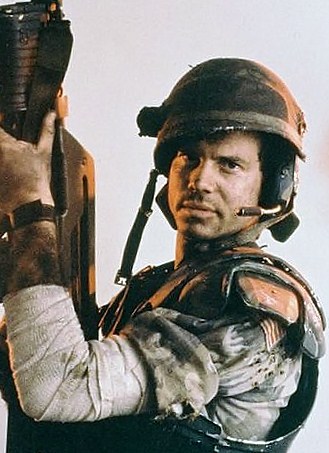"Game over, man!" - Private Hudson, Aliens
The sequel to Ridley Scott's 1979's Alien, Director James Cameron’s Aliens hit theatres in 1986, thrilling with special effects, intense action scenes, and loaded with meaning. Aliens was a box office hit, earning more than $130 million and cementing the Alien franchise (mostly a good thing, though I could have done without Alien vs. Predator).
Sigourney Weaver was back in action as Ripley, but this time her sense of isolation as the last survivor on a spaceship, hunted by a single killer alien was replaced by a different kind of vulnerability as scores of aliens hunt her.
But just as the alien is no longer solo. Ripley has company. She takes on the role of a surrogate mother to a little girl as a military squad plays the masculine role of protector.
Alien 2 wasn't just a blockbuster action film. It makes a serious critique of the military-industrial complex, explores masculinity, and presents anxieties of childbearing with concomitant body horror. But Aliens is a pure joy to watch. By any standard, it's one of the greatest science fiction films.
We’ll explore all these elements, but let’s turn to the military-industrial complex as it relates to Aliens first.
Aliens and the Military-Industrial Complex
The military-industrial complex exists because of a balance of political and economic realities. And economies are fickle things. They go up. They go down. But when the industries of a society have a war to churn out products for, economies boom. Japan was largely able to finance all of its military conquests before and during the 2nd World War as a result of supplying war implements during the first World War. Why is this possible? Because wars cost a lot. Wars require tanks, planes, bombs, guns, body bags, and even some good, old-fashioned R&D, which generates new things for governments to shell out money for, which, in turn, gives lots of people good paying jobs.
Here’s where the military-industrial complex (MCI) and war arrangement gets much worse, 1984 worse. Since it is demonstrable that societies fare better as a result of war, governments perpetuate war forever. The military finds wars to wage while industries churn out the war machine. If you think it strange that the US has been in a constant state of war for decades, consider the mutually beneficial military-industrial complex arrangement. The arrangement guarantees war. The Manhattan Project, which Paul Virilio says released a scientific “sorcerer’s spirit” (Ground Zero 65) marked the nascence of the military-industrial complex in the United States. Harnessing nuclear energy to create a doomsday weapon wasn’t the end of military research and development in the United States. No, it was the beginning. After WWII, the US has relied economically and politically on its military-industrial complex.
Here’s where the military-industrial complex (MCI) and war arrangement gets much worse, 1984 worse. Since it is demonstrable that societies fare better as a result of war, governments perpetuate war forever. The military finds wars to wage while industries churn out the war machine. If you think it strange that the US has been in a constant state of war for decades, consider the mutually beneficial military-industrial complex arrangement. The arrangement guarantees war. The Manhattan Project, which Paul Virilio says released a scientific “sorcerer’s spirit” (Ground Zero 65) marked the nascence of the military-industrial complex in the United States. Harnessing nuclear energy to create a doomsday weapon wasn’t the end of military research and development in the United States. No, it was the beginning. After WWII, the US has relied economically and politically on its military-industrial complex.
Alien 2 criticizes the results of the military-industrial complex in the United States. The alien problem is created artificially by the Weyland-Yutani Corporation. They want to further study the Xenomorph XX121 species, regardless of the harm they cause to their employees. So, Wey-Yu creates a colony on LV-426, the planet playing host to the crash-landed derelict ship that Ripley and her crew encountered in the first Alien movie.
A family on the new colony is sent to the crash site, lambs to the slaughter, really. The family makes first contact and quickly meets their demise, save for Newt. Eventually, the rest of the colony is summarily killed by the not-so-friendly Xenomorphs. Conflict created, in come the soldiers, complete with a futuristic, tank-like vehicle and hi-tech weaponry—the sentry guns are particularly awesome. All of this gear is a direct reflection of our own MCI. In the US, the military-industrial complex requires constant war and a constant upgrading of weapons technology, including miniaturization, automation, lethality, and speed.
It’s no surprise that Vasquez reads as the most masculine of the military unit. The Alien series is, at heart, an exploration of the feminine, and Alien 2 stays within the logic of that narrative. It considers motherhood as a body invasion. Its dangerous species, the Xenomorphs, are organized in a matriarchal hierarchy. And Ripley, who nurtures Newt, plays as the antithesis of the alien queen. Both figure in as mothers but the alien queen propagates her species by seeding humans, whereas Ripley extends her mothering nature to children that are not her own.
But even without pregnancy resulting in death, the takeover of a mother’s body by her growing child is, notwithstanding desirability, still a foray into the uncanny. The body is no longer autonomous but uses its energy to grow another, separate living thing. Neither do women always wish to become mothers. The likelihood that the Xenomorph species could impregnate anyone, at any time, reflects the fear of women who are not prepared to have a child. For young, unattached women, having a child is the signal of the death of one way of life and entry into a lifetime of adult responsibility.
Alien 2 has all the gear you'd expect of a MCI based society. As Private Hudson reports: “Check it out! Independently targeting particle beam phalanx. Vwap! Fry half a city with this puppy. We got tactical smart missiles, phased plasma pulse rifles, RPGs, we got sonic electronic ball breakers! We got nukes, we got knives, sharp sticks.” The cutting edge state of these weapons is important because despite the power of these weapons, the Aliens as weapons are more powerful. Yes, the military-industrial complex has their next weapon ready to deploy.
If there’s no real conflict to insert the military, a conflict can be created without all that much difficulty. Reasons for wars can be dreamed up in an instant. Just consider the conflict in Aliens. Here, a new colony requires defending. And for the last few centuries, there's always been more land to colonize. The colonial war is an important element in the critique of the military-industrial complex. While profitable, no one wants a war on their own doorstep. War is best sent off to the periphery, away. Out there, the bullets can fly and the soldiers can die while at home we can all can build bigger houses, drive cars that appear as parodies of military vehicles, and carry on our lives without giving thought to the death worlds that exist on other shores.
The first law of the military-industrial complex is that people are expendable. This is really the first law of both capitalism and socialism as well. In fact, in any arrangement of power, people--bodies in euphemistic terms--are always expendable. But in societies in which the development and exchange of products ensures economic growth, loss of life is fine so long as a profit is made. Consider that in every war in the modern world, many individuals dramatically increased their wealth. For example, the Vanderbilts, Armours, and Morgans dramatically increased their wealth as a result of the American Civil War.
1986 was squarely in the middle of the Iran-Contra Scandal of 1985-1987. President Reagan and his staff cooked up a plan to illegally sell arms to Iran and use the proceeds to outfit the Nicaraguan Contras. These actions were all completely corrupt. Aliens’ outfitting of a military unit to fight a war in a far-flung colony is clearly a nod to the day’s scandal. Clear and Present Danger would later offer a remix of the Iran-Contra era’s corruption, ending with a clear admonition of guilt from the narrative's fictional president.
Female Masculinity in Aliens
So, what of masculinity? The most important element here is that the individual with the most masculine characteristics is a woman. Jenette Goldstein plays Private Vasquez, a fearsome lady toting a massive machine gun as phallic signifier. She’s fearless and completely cool with reading as masculine. Consider her short exchange with Private Hudson:
Private Hudson : Hey Vasquez, have you ever been mistaken for a man?
Private Vasquez : No. Have you?
Vasquez’ bold reply registers as a critique of masculinity clearly belonging to men. Here, the male body doesn’t retain as the ultimate evidence of masculinity. Though Vasquez is tough looking, with iron biceps and a ready-to-kick-ass look on her face, her fearless impassiveness reads as masculine. Indeed, her level of toughness and confidence exceeds the projected masculinity of the male soldiers around her.
In the above image, Ripley is overloaded with both masculine and feminine signifiers. With one arm she protects a child and with another she has a finger on a trigger of a particularly phallic looking rifle. Ripley operates with a mix of courage, duty, and fearlessness that read as neither masculine or feminine; rather, they read as human.
Ripley’s mothering nature is all the more honorable in the face of the anxieties over childbearing represented in the Alien franchise. The alien gestation and eruption articulates the feeling that the mother's body is no longer her own, that her body is working not in her interest, but in the interest of a life that is not her own.
The Alien movies resonate with more than just psychological childbirth anxieties. Mothers have valid fears about their health and the health of the baby they carry. While the death of mothers during childbirth is now highly rare, something like fifteen in every 100,000 births end in the death of the mother. In prior centuries, childbirth was much more dangerous, seeing mortality percentages of 1-3%. That’s thousands of deaths per 100,000 births. So, on one level, the Alien franchise preserves a folktale fear of mother’s mortality. But, especially in poorer countries, childbirth holds a great deal of uncertainties, including body morphing of the mother's offspring as a result of the Zika virus.
Even without the fear of Zika, the anxiety about the health of mother and child is as old as humanity. Some pregnancies result in deformed children, some deformations handicapping the child for life, others result in disfigurements, still others result in infant mortality. Many a mother has had to suffer the tragedy of a stillborn birth. And the ability to even bear children is not a certainty. The barren womb figures as a different kind of body horror, where outwardly the body is intact but inwardly the body does not function properly.
What does it mean that the United States, a land that many look to as part of the birth of democracy in the world, has more recently mothered the creation of the most devastating, dangerous weapons in the world? What does it mean that a country that touts itself as the beacon of freedom the world over maintains the strongest military in the world? Should American citizens feel a kind of body horror at the strange children our democracy has birthed? Must freedom and democracy parade itself with the signifiers of naked aggression? Is the only guarantee of democracy's continuation to rely on the institutionalization of militaristic diplomacy?
Even without the fear of Zika, the anxiety about the health of mother and child is as old as humanity. Some pregnancies result in deformed children, some deformations handicapping the child for life, others result in disfigurements, still others result in infant mortality. Many a mother has had to suffer the tragedy of a stillborn birth. And the ability to even bear children is not a certainty. The barren womb figures as a different kind of body horror, where outwardly the body is intact but inwardly the body does not function properly.
What does it mean that the United States, a land that many look to as part of the birth of democracy in the world, has more recently mothered the creation of the most devastating, dangerous weapons in the world? What does it mean that a country that touts itself as the beacon of freedom the world over maintains the strongest military in the world? Should American citizens feel a kind of body horror at the strange children our democracy has birthed? Must freedom and democracy parade itself with the signifiers of naked aggression? Is the only guarantee of democracy's continuation to rely on the institutionalization of militaristic diplomacy?
Of course, along with these imbricated layers of meaning, you can still enjoy all the alien killin’ scenes and Ripley’s escape from the colony. But, hey, maybe the reality that war is easily turned into entertainment is just more evidence that something is deeply wrong with humanity.
--Transmission Terminated--
The science fiction isn't making you feel good?
No, man! No.
Feeling alienated?
That's not funny, Dude.
The colonial marines aren't doing it for you?
They were, but then they got wiped out!
Maybe you're not sure you belong on a Terran planet?
-silence-
-silence-
Well, you probably don't. You're likely an aging robot that's programmed to believe you're human. Could be a first generation Nexus model. Well, don't let that stop you from having a good time. Kick back, grab a watery American beer, order a pizza, and dive deep into the singular information rush of this weird little cul-de-sac of the 'net. We don't need roads where we're going. We're on the information autobahn.
Loading next Rapid Transmission:






